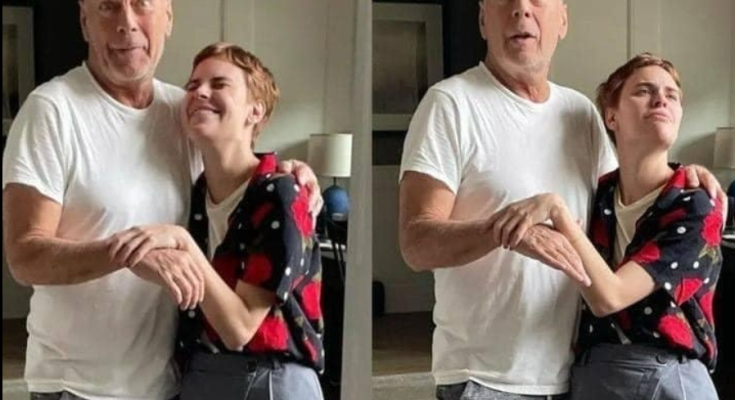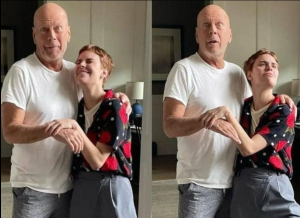🕯️ When the Voice Fades: Bruce Willis and the Quiet Power of Presence
There are few voices in Hollywood as instantly recognizable as Bruce Willis’s—gravelly, sardonic, full of mischief and grit. For decades, he spoke in punchlines and poetry, in smirks and monologues, in the language of action and vulnerability. But now, that voice has quieted.
Bruce Willis, once a voracious reader and charismatic performer, is no longer able to communicate verbally due to the progression of frontotemporal dementia (FTD), a neurodegenerative condition that affects language, behavior, and personality. The man who once delivered iconic lines in Die Hard, Moonlighting, and The Sixth Sense now navigates the world through a different kind of presence—one that does not rely on words.
And yet, he is still Bruce.
🧠 Understanding FTD: The Thief of Language
Frontotemporal dementia is not just memory loss. It’s a reshaping of the brain’s architecture, particularly in the frontal and temporal lobes—the regions responsible for speech, empathy, and self-awareness. As these areas atrophy, language becomes elusive. Words slip away. Sentences fragment. The ability to read, write, or even recognize one’s own decline fades.
For Bruce, this began with aphasia—a language disorder that prompted his retirement from acting in 2022. But as the disease progressed, his verbal abilities diminished further. Friends and family describe his current state as “seeing life through a screen door”—present, but distant.
Glenn Gordon Caron, creator of Moonlighting, shared that Bruce still recognizes familiar faces for a few minutes, but the vibrant “joie de vivre” that once defined him has dimmed. His wife, Emma Heming Willis, and ex-wife Demi Moore remain by his side, offering love and care in the face of a disease that reshapes identity.
🎬 The Man Behind the Roles
Bruce Willis was never just an action star. He was a storyteller. A risk-taker. A man who could deliver a line with both swagger and sorrow. He played haunted psychologists, flawed detectives, time travelers, and reluctant heroes. He made vulnerability masculine. He made silence meaningful.
Off-screen, he was a father, a husband, a friend. He loved books—quietly, privately. He cherished connection. And now, in the absence of speech, those connections are being redefined.
His daughter Tallulah recently described his dementia as “really aggressive,” but emphasized that his core essence remains unchanged. He still expresses love. He still shows up. And in that showing up, there is beauty.
🕊️ When Words Leave, What Remains?
There is a sacredness to silence. In many cultures, silence is not emptiness—it is reverence. It is the space where presence deepens. Bruce’s silence, though unchosen, invites us to witness him differently.
We are asked to see not the performer, but the person. Not the voice, but the gaze. Not the dialogue, but the devotion of those around him.
His family calls this a “family disease,” because dementia doesn’t just affect the diagnosed—it reshapes the entire orbit of care, memory, and meaning. Emma Heming Willis has spoken candidly about the pain and clarity that come with acceptance. “Just being in the know of what is happening to Bruce,” she said, “makes it a little bit easier”.
📸 A New Kind of Archive
In the absence of new performances, fans and loved ones are turning to the archive. Rewatching Moonlighting, now digitally remastered. Revisiting Pulp Fiction, Unbreakable, Looper. Listening to old interviews where Bruce spoke about fatherhood, fame, and fear.
But perhaps the most powerful archive is not cinematic—it’s emotional. It’s the memory of how his voice made us feel. The way he could deliver a line like “Yippee-ki-yay” and make it a mantra. The way he could whisper “I see dead people” and make it a revelation.
Now, we see Bruce differently. Not through sound, but through stillness.
🧩 Communal Witnessing: What We Can Learn
Bruce Willis’s journey is not just personal—it’s communal. It invites us to reflect on how we treat aging, illness, and silence. In a culture obsessed with youth and productivity, his story reminds us that presence is enough. That being loved, even in decline, is a form of grace.
It also challenges us to rethink communication. What does it mean to connect without words? To express love through touch, memory, ritual?
Bruce’s silence is not a void—it’s a mirror. It asks: What remains when language fades? What do we hold onto? What do we let go?
🧠 Reframing the Narrative
Too often, stories of dementia are framed as tragedy. And yes, there is loss. But there is also transformation. There is the possibility of deeper witnessing. Of showing up without needing to fix. Of loving someone not for what they say, but for who they are.
Bruce Willis is still Bruce. Not because he speaks, but because he is.
His story is not over. It is simply unfolding in a quieter key.
🕯️ Closing Reflection: The Voice Beneath the Silence
Let this be a tribute—not just to Bruce, but to everyone navigating the quiet terrain of cognitive decline:
May your silence be honored. May your presence be enough. May your loved ones speak your name with tenderness. May your story be remembered not for what was lost, but for what was felt.


